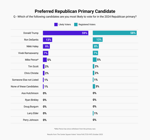(The Center Square) – Former President Donald Trump continues to dominate the Republican primary field, according to new polling, as his opponents are set to take the debate stage on Wednesday in Miami.
Trump’s Republican opponents will duke it out in Florida, but at least for now they are fighting for second place. The Center Square Voters’ Voice Poll, conducted in conjunction with Noble Predictive Insights, now shows that Trump far outpaces his Republican opposition, even while skipping the debates and facing nearly 100 criminal charges in four separate indictments. How those criminal charges will affect Trump’s candidacy remains to be seen.

The poll of 2,605 voters includes 1,035 Republicans, 1,074 Democrats, and 496 true Independents, and is among the most comprehensive in the country.
“Trump is continuing to dominate the primary field. We have seen some changers beneath the surface,” David Byler, chief of research at Noble Predictive Insights, told The Center Square. “As Nikki Haley has shown some strength in the debates and posted some strong fundraising numbers, we’ve seen her star rise and her join clearly a second tier that includes herself and Florida Gov. Ron DeSantis.
“But really there is only one candidate in the top tier and his name is Donald Trump,” he added.
The poll asked likely Republican voters who they would vote for for the 2024 presidential nomination, and Trump, who is not expected to debate Wednesday, has more support than all his challengers combined.
The poll found Trump leads the Republican field with 59% support among likely voters, trailed by DeSantis at 13% support and Haley, a former ambassador and governor, at 9% support.
Businessman and author Vivek Ramaswamy, who has made a polarizing splash at his debates, has 7% support while former Vice President Mike Pence, who has since dropped out of the race, is at 5% support.

U.S. Sen. Tim Scott, R-S.C., and former New Jersey Gov. Chris Christie are tied at 2% support.
In addition, 1% of those likely Republican voters said they would vote for “none of these candidates” and another 1% said they would vote for “someone else not listed.”
Notably, the survey was conducted before Pence announced he was withdrawing from the race.
The Republican primary’s Iowa Caucus is scheduled for Jan. 15 with the yet-to-be-scheduled New Hampshire primary likely soon after. Those early state contests mean less for stronger candidates like Trump but can make all the difference for lower-tier candidates trying to build momentum and raise money for their campaign. Performing well in those races could also set a candidate up to become a viable pick for vice president.
“If you look across the polling, Republicans really want [Trump] to have a third run at the White House,” Byler said, referencing an array of polling from multiple research groups. “You see that “Republican voters believe that Trump is electable. They like his policies. They know him from seeing him have a full term in the White House, and right now he is in a very dominant position.”
The polling also shows that voters who do not have Trump as their first choice are not necessarily “never Trumpers.” The survey found that even when put in a hypothetical head-to-head matchup with DeSantis or Haley, Trump still beats them by double digits.
In a faceoff against DeSantis, Trump wins with 68% support among Republican likely voters to DeSantis’ 32% support. Against Haley, Trump wins with 73% support to Haley’s 27% support.
“We tested specific matchups of [Trump] against Haley and him against DeSantis,” Byler said. “And what you saw when you had just a one-on-one matchup … Trump still cleaned up. This wasn’t a matter of, ‘oh could the anti-Trump forces consolidate enough and get behind a candidate.’”
In fact, Trump appears as strong or stronger in this primary than his first Republican primary, where he dominated his opponents.
“In the 2016 election, Trump was consistently below 50% in the polls and the key question was whether or not his alternatives could coalesce around one candidate who could beat him,” Byler said. “That is no longer the case. That is no longer the operative question … According to our polling, Trump is winning 2 to 1 against single candidates who are his strongest opponents, so the question here is, not can the anti-Trump forces unite. The question is, can the anti-Trump forces unite and shave off another 20% of Donald Trump’s vote share, which is a whole other ball game compared to his last run.”
The poll was conducted by Noble Predictive Insights from Oct. 20-26 of this year with a margin of error of 1.92%.
Trump’s lead over his Republican rivals has increased since the previous The Center Square Voters’ Voice poll conducted in July. The summer poll of 2,500 voters had Trump with a 53% lead over DeSantis (18%), Pence (7%), Ramaswamy (6%), Haley and Scott (4% each).
The poll weighted each party – Republicans, Democrats, and True Independents – independently, according to Noble Predictive. In other words, the Republican subsample is weighted so it matches the national Republican population, and the same is true for Democrats and True Independents.

